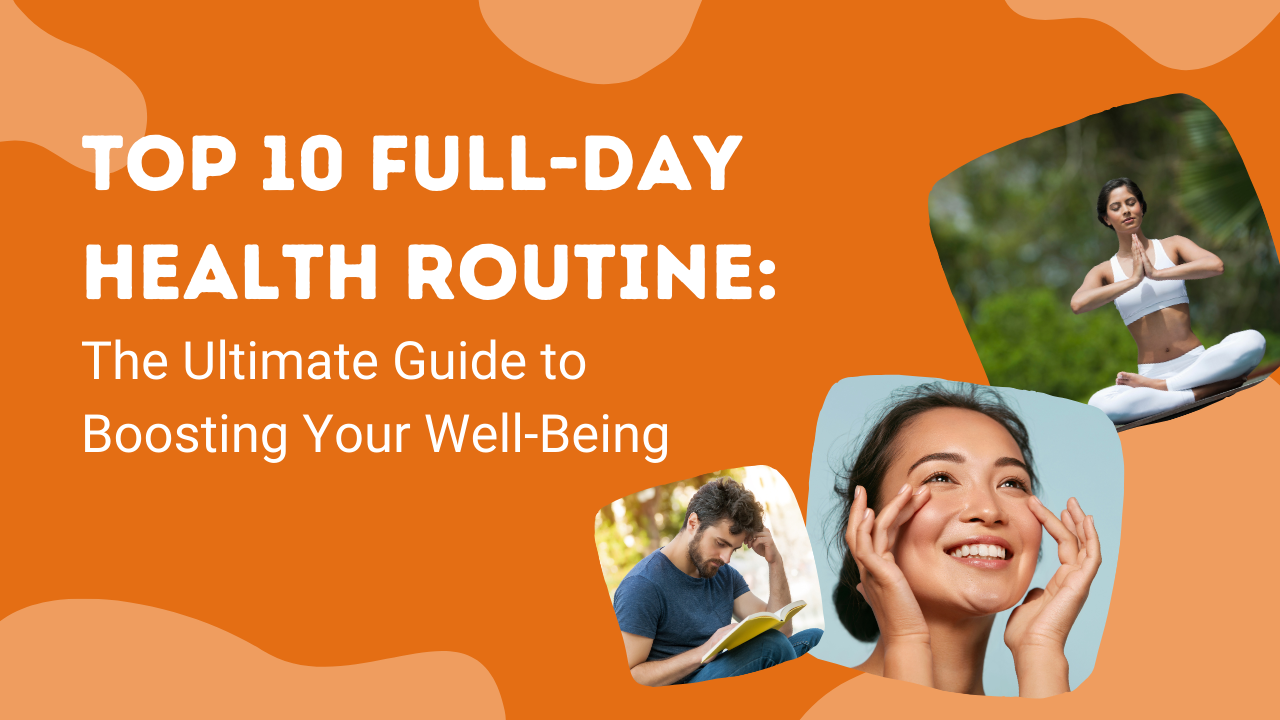A healthy routine goes beyond just working out or eating well. It involves taking care of your body, mind, and emotions in a balanced way. True wellness means paying attention to how you feel physically and mentally throughout the day, not just during workouts or mealtimes.
A full-day health routine includes healthy habits from morning to night. This starts with energizing rituals in the morning, productive activities during the day, and calming practices in the evening to help you sleep better. It’s important to stay consistent with your habits to build long-term health.
In this guide, we’ll explore the Top 10 Health Habits that can improve your daily life. You’ll find simple tips, timing suggestions, and key benefits for each habit. Whether you want more energy, better sleep, or a stronger mind, this routine can help you stay balanced and feel your best every day.
Morning Mindfulness & Meditation: Start Your Day with a Calm Mind

Why It’s Important:
Starting your day with a clear and calm mind can shape how the rest of your day unfolds. The first few moments after waking up are powerful because your mind is fresh and more open to calm, focused thoughts. Practicing mindfulness or meditation in the morning helps reduce mental noise, clears away stress, and prepares you for the day ahead with a positive mindset. It can also set a peaceful rhythm that helps you better manage your reactions, stay focused, and make healthier decisions throughout the day.
Routine Breakdown:
Time: Set aside 10 to 20 minutes right after you wake up in the morning. This is an ideal time because your mind is still fresh and not yet filled with the day’s distractions. Even a short session can make a noticeable difference in your mood and focus throughout the day.
Method: Choose a quiet and peaceful spot where you feel comfortable. You can sit upright in a relaxed position or lie down if that feels better. Close your eyes and begin to focus on your breathing—take slow, deep breaths in and out. If your thoughts wander, gently bring your attention back to your breath. For extra support, you can use a guided meditation app like Headspace or Calm, which offers easy step-by-step sessions for beginners and advanced users alike.
Benefits: This short morning practice helps sharpen your concentration and improves how you manage your time and tasks during the day. It reduces feelings of stress and anxiety by calming your nervous system and quieting racing thoughts. Over time, it also helps you gain better control over your emotions, making you more patient, balanced, and emotionally aware in daily situations.
Example:
| Time | Activity |
|---|---|
| 6:00 AM | Wake up, hydrate with water |
| 6:05 AM | Practice mindfulness/meditation |
| 6:25 AM | Stretching or light yoga |
Hydration: Drink Water for Optimal Health
Why It’s Important: Staying hydrated is vital for keeping your body healthy. Water plays a key role in flushing out toxins, helping your body digest food properly, and keeping your skin clear and refreshed. Drinking enough water each day supports overall well-being, boosts energy levels, and ensures that all your organs function smoothly throughout the day.
Routine Breakdown:
Time: Start your day by drinking a glass of water right after you wake up. This helps rehydrate your body after hours of sleep, kick-starts your metabolism, and prepares your digestive system for the day ahead. It’s a simple yet powerful way to energize your body first thing in the morning.
Goal: Make it a goal to drink at least 8 glasses of water, or around 2 liters, over the course of the day. Spread your intake evenly—drink water with meals, during physical activity, and whenever you feel thirsty. Keeping a water bottle nearby can help you stay consistent and remind you to take sips regularly.
Benefits: Proper hydration helps boost your metabolism, making it easier for your body to burn calories efficiently. It also plays a role in healthy weight management by reducing unnecessary snacking, as thirst is often mistaken for hunger. Staying hydrated improves brain function too, helping you stay focused, alert, and mentally clear throughout the day.
Example
| Time | Activity |
|---|
| 6:00 AM | Drink 1 glass of water |
| 9:00 AM | Drink 1 glass of water |
| 12:00 PM | Drink 1 glass of water |
| 3:00 PM | Drink 1 glass of water |
Energizing Breakfast: Fuel Your Body with the Right Nutrients

Why It’s Important:
Why It’s Important:
Breakfast is one of the most important meals of the day because it gives your body the fuel it needs after a long night without food. Eating a healthy breakfast helps restore your energy, jump-start your metabolism, and provides key nutrients to keep your body and brain working properly. Skipping breakfast can lead to low energy, poor focus, and overeating later in the day.
Routine Breakdown: Try to eat your breakfast within 30 minutes of waking up. This helps your body start the day with steady energy and prevents blood sugar dips. A balanced breakfast should include protein to build and repair tissues, fiber to support digestion and keep you full, and healthy fats for long-lasting energy. Choose simple, nourishing meals that don’t take long to prepare.
Example Meal: You can have scrambled eggs with sliced avocado and a piece of whole-grain toast for a filling and satisfying meal. Another good option is a smoothie made with spinach, berries, and protein powder—quick to make and easy to digest.
Benefits: A well-balanced breakfast helps stabilize your blood sugar, which keeps your energy levels steady and prevents mood swings. It also supports better focus and concentration, especially in the early part of the day. Eating breakfast regularly can also help with healthy weight management by reducing cravings and controlling hunger throughout the day.
Example:
| Time | Meal |
|---|---|
| 6:30 AM | Scrambled eggs, avocado, whole-grain toast |
| 7:00 AM | Green smoothie (spinach, berries, almond milk) |
Physical Activity: Move Your Body to Enhance Strength & Stamina
Why It’s Important: Staying physically active is essential for your overall health and well-being. Regular exercise helps keep your heart strong, improves blood circulation, and supports the health of your muscles and bones. It also plays an important role in boosting your mood by releasing feel-good hormones like endorphins, which help reduce stress and anxiety. Being active regularly can improve both your physical and mental health over time.
Routine Breakdown: Aim to exercise for about 30 to 45 minutes on at least five days of the week. This time can be split between different types of activities to keep things interesting and effective. For example, include cardiovascular exercises such as brisk walking, cycling, or jogging to get your heart rate up. Add strength training exercises like bodyweight movements (push-ups, squats) or light weightlifting to help build muscle and support bone density.
Benefits: Consistent exercise strengthens your heart and improves overall cardiovascular health, helping to prevent heart disease. It also increases your energy levels by improving oxygen flow and endurance. Over time, regular physical activity can reduce the risk of chronic health conditions such as diabetes, high blood pressure, and obesity, making it an important part of a long-term healthy lifestyle.
Example:
| Time | Activity |
|---|---|
| 7:30 AM | 20-minute jog or brisk walk |
| 8:00 AM | 15-minute strength training |
Mid-Morning Snack: Boost Your Energy Levels

Why It’s Important:
Having a healthy mid-morning snack is important to keep your energy levels steady throughout the day. It helps prevent that sluggish feeling or energy crash you might experience before lunch. By fueling your body with a nutrient-dense snack, you also support your metabolism and avoid overeating during lunchtime, which can help with overall portion control and weight management.
Routine Breakdown: Aim to have your mid-morning snack about 2 to 3 hours after breakfast. This gives your body enough time to digest your morning meal and keeps you from feeling too hungry before lunch. Focus on choosing snacks that are rich in protein, which can help keep you feeling full longer and support muscle repair. Include healthy fats and fiber for added benefits.
Example Snack: A great option is a handful of almonds, which provide healthy fats and protein, or Greek yogurt with chia seeds. Both are nutrient-dense choices that offer long-lasting energy without causing a sugar spike or crash.
Benefits: A mid-morning snack helps to stabilize blood sugar levels, preventing dips that can cause irritability or fatigue. It can also prevent overeating later in the day, making lunch feel more balanced and satisfying. Additionally, if you’ve had a workout in the morning, a protein-rich snack supports muscle recovery and replenishes your energy stores.
Example:
| Time | Snack |
|---|---|
| 9:30 AM | A handful of almonds or walnuts |
Lunchtime: Balanced Meal for Sustained Energy
Why It’s Important:
Lunch plays a crucial role in providing your body with the necessary nutrients to sustain energy levels throughout the afternoon. It’s an opportunity to refuel after a busy morning and give your body the fuel it needs to stay energized, focused, and productive for the second half of the day. A balanced lunch with the right mix of protein, carbs, and vegetables ensures that your body gets the essential nutrients for muscle repair, growth, and overall well-being.
Routine Breakdown: Aim to have lunch between 12:00 PM and 1:00 PM, when your body can benefit most from the nutrition it needs to power through the afternoon. Focus on including lean proteins like chicken, tofu, or fish to build and repair muscle. Add complex carbohydrates, such as brown rice or quinoa, to provide sustained energy and fiber for digestion. Don’t forget plenty of vegetables, which are packed with vitamins and minerals that support overall health.
Example Meal: A well-balanced lunch could be a grilled chicken salad with quinoa, mixed greens, and a light vinaigrette dressing. This meal offers a healthy dose of lean protein, fiber-rich carbs, and nutrient-dense vegetables, making it both filling and energizing.
Benefits: A nutritious lunch helps maintain your energy levels so you don’t feel sluggish in the afternoon. It also supports muscle repair and growth, especially if you’ve exercised earlier in the day. The combination of lean protein, fiber, and vegetables ensures that you’re getting the essential vitamins and minerals your body needs to function at its best and stay strong throughout the day.
Example:
| Time | Meal |
|---|---|
| 12:30 PM | Grilled chicken with quinoa and vegetables |
Afternoon Break: Recharge Your Mind & Body

Why It’s Important:
Taking a mid-afternoon break is essential for preventing mental burnout and helping you maintain focus throughout the day. After hours of work or activity, your brain can start to feel fatigued, leading to reduced productivity and creativity. A short break in the afternoon allows you to recharge, reduces stress, and helps you stay refreshed, ensuring that you stay on track for the rest of the day.
Routine Breakdown: Schedule your mid-afternoon break between 3:00 PM and 3:30 PM. This is a great time to step away from your desk and take a few minutes to reset. Engage in light activities such as going for a short walk, doing some gentle stretching, or practicing mindfulness through a brief meditation session. These activities can help release built-up tension and give your mind a moment to relax.
Method: A walk around the block or stretching can help loosen up tight muscles and refresh your body. If you prefer something more calming, a mindfulness session or a few minutes of deep breathing can help clear your mind and reduce stress.
Benefits: Taking a break helps improve mental clarity, making it easier to focus on tasks when you return to work. It also reduces the feelings of fatigue that can set in after hours of continuous activity. By stepping away for a moment, you enhance your creativity, allowing fresh ideas to flow more freely, and boost productivity for the remainder of your day.
Example:
| Time | Activity |
|---|---|
| 3:00 PM | Take a short walk or do stretching |
Dinner: Light & Digestible Meals for Better Sleep
Why It’s Important:
Having a light, balanced dinner is key to avoiding the sluggish feeling that can come from heavy meals late in the day. Eating a well-rounded dinner supports your digestion and helps your body unwind after a busy day. It ensures your body has the necessary nutrients for recovery and repair while preventing overeating before bedtime, which can disrupt sleep. A healthy dinner helps promote relaxation and sets you up for a restful night’s sleep.
Routine Breakdown: Plan to have your dinner between 6:30 PM and 7:30 PM, allowing your body ample time to digest before bedtime. Focus on incorporating lean proteins, such as fish or legumes, that provide essential amino acids for muscle repair. Add plenty of vegetables for fiber, vitamins, and minerals, and include a small serving of healthy fats, such as those found in olive oil or avocado, to support overall health.
Components: Your dinner should be nourishing but not overly filling. Lean protein helps your body repair tissues and muscles, while vegetables provide essential nutrients for maintaining bodily functions. A small serving of healthy fats ensures your body can absorb vitamins and supports heart and brain health without weighing you down.
Example Meal: A great dinner option could be baked salmon paired with steamed broccoli and a side of sweet potato. This meal provides a balanced mix of protein, fiber, and healthy fats to keep you satisfied without causing discomfort before sleep.
Benefits: A balanced dinner supports digestion throughout the night, helping your body process nutrients effectively. It also assists in muscle recovery, which is particularly important if you’ve been physically active during the day. Additionally, a light, healthy meal promotes better sleep, as it prevents feelings of fullness or indigestion that can interfere with a peaceful rest.
Example:
| Time | Meal |
|---|---|
| 6:45 PM | Baked salmon, steamed broccoli, and sweet potato |
Evening Wind-Down: Prepare for Restful Sleep
Why It’s Important:
Establishing proper wind-down habits before bed is crucial for improving sleep quality and ensuring your body has the time to fully recover overnight. Taking time to relax and prepare for sleep helps signal to your brain that it’s time to rest, making it easier to fall asleep and stay asleep. By creating a peaceful bedtime routine, you can reduce stress and set the stage for deeper, more restorative sleep.
Routine Breakdown: Begin winding down about 30 to 60 minutes before you plan to sleep. This is the ideal time to start transitioning from the busyness of the day to a more relaxed state. Avoid engaging with screens, such as phones, tablets, or computers, as the blue light emitted can interfere with your ability to fall asleep. Dim the lights in your environment to help your body produce the sleep hormone melatonin, which naturally prepares you for rest.
Method: Engage in calming activities that help relax both your mind and body. Consider reading a book, listening to soothing music, or practicing light yoga or stretching to release any tension. These activities can ease anxiety and prepare you for a peaceful night of rest.
Benefits: Wind-down habits significantly reduce the chances of insomnia by helping your body transition smoothly into sleep. They also improve sleep quality by allowing you to fall asleep faster and enjoy deeper rest. In addition, a relaxing bedtime routine supports the regulation of hormones that control sleep and stress, enhancing both the quantity and quality of your sleep.
Example:
| Time | Activity |
|---|
| 9:30 PM | Dim lights, avoid screens |
| 9:45 PM | Light stretching or reading |
Sleep: The Cornerstone of Health

Why It’s Important:
Sleep is a critical component of overall health, providing your body with the necessary time for both physical and mental recovery. It plays a key role in mood regulation, cognitive function, and maintaining general well-being. Without adequate rest, the body cannot repair itself fully, and cognitive abilities such as concentration, memory, and decision-making may be compromised. Prioritizing sleep is essential for staying energized and mentally sharp throughout the day.
Routine Breakdown: Aim for 7 to 9 hours of sleep each night to ensure that your body gets the full benefits of restful sleep. To achieve quality sleep, it’s important to establish a consistent sleep schedule by going to bed and waking up at the same time each day. This helps regulate your body’s internal clock and improves sleep patterns over time.
Tips for Quality Sleep:
Benefits: Getting enough sleep boosts your immune system, allowing your body to fend off illnesses more effectively. It also supports memory and cognitive function by enhancing the brain’s ability to process and retain information. Additionally, a good night’s sleep contributes to improved mood and emotional well-being, helping you feel more positive, balanced, and ready to take on the day.
Example:
| Time | Activity |
|---|---|
| 10:00 PM | Sleep |
Conclusion
A full-day health routine is about consistency, not perfection. Start by adding one habit at a time and gradually build your ideal routine. Over time, you’ll notice the benefits of a holistic approach to health—improved energy, better mental clarity, and long-term physical well-being.
By focusing on nurturing your body, mind, and soul throughout the day, you’ll move closer to a more balanced and healthier lifestyle. It’s important to remember that progress doesn’t happen overnight. Small, consistent changes can lead to significant results over time. Keep working on these habits daily, and you’ll experience the positive impact they have on your overall health. The key is to make manageable adjustments that you can maintain, allowing you to feel your best, inside and out.
FAQs
- Can I customize this routine to fit my schedule ?
Answer:
Yes! This routine is flexible. Feel free to adjust the timing or intensity of activities to suit your day-to-day schedule, energy levels, and preferences. - How much time should I dedicate to each activity daily ?
Answer:
The total time can vary, but typically you’ll spend about 1-2 hours throughout the day on the suggested activities. You can break them up into manageable chunks based on your available time. - What if I can’t follow the routine every day ?
Answer:
It’s okay to miss a day or two. The goal is consistency over time. If you miss a part of your routine, simply pick up where you left off and stay committed to your overall health journey. - What should I do if I don’t have time for a full workout session ?
Answer:
Even short bursts of exercise—like a 10-15 minute walk or quick bodyweight workout—are beneficial. Any movement is better than none, so prioritize what works best for you on busy days. - How can I stay motivated to maintain this routine long-term ?
Answer:
To stay motivated, set small, achievable goals and track your progress. Celebrate milestones, mix up your activities, and remind yourself of the benefits you’re experiencing, like more energy and better sleep.


